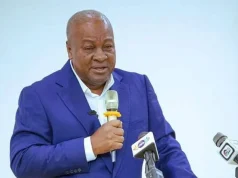The Ministry of National Security has intensified its “see something, say something” campaign across border communities in the Upper East Region.
The campaign, which is part of a series of regional campaigns, aims at sensitising residents on their personal security and on activities that could potentially compromise security in their communities.
It is also to encourage participation in safeguarding and sustaining national security.
National security is a shared responsibility that requires the general buy-in of citizens to complement government efforts.
The campaign in the region is therefore to sensitise members of border communities to be vigilant at all times and share information with security agencies or call a toll-free number (999) on suspicious activities and characters to avert a possible mishap. The campaign, now more than ever, has become important given happenings in neighbouring countries, particularly Burkina Faso.

Addressing a cross section of residents in the respective districts in the region, Mrs. Akosua Danquah Ntim Sekyere, leader of the campaign team, indicated that the influx of refugees from Burkina Faso into the region requires vigilance from the residents to identify and report suspicious characters.
“We can’t be sure of who is coming in, even though some come in with refugee status. You cannot look at a person’s face and tell their intentions; hence, the public education is aimed at sensitising the citizenry to be aware of the dangers that come with the influx of refugees, as well as their roles as citizens to help safeguard national security,” she added.
Mrs. Ntim Sekyere further expressed concerns at the rate of prank calls to the emergency call centre (toll-free number 999) and admonished all to desist from the practise and only call to report suspicious activities or characters.

According to her, “out of the calls received at the call centre daily, prank calls outnumber valid calls, a very worrying trend.”
She indicated that the campaign is a national assignment devoid of political affiliations and urged traditional leaders and members of the communities to contribute to safeguarding national security.
Residents were also urged to maintain effective communication channels with community leaders and security agencies, promoting openness and information sharing by observing and reporting individuals exhibiting signs of radicalization or unusual behaviours.
Traditional leaders across the border communities commended the government for the initiative and called for the improvement of border security measures, including unapproved routes.
They pledged their unflinching support for ensuring peace and stability in their respective communities and the region as a whole.
It would be recalled that the flagship campaign launched last year by the Ministry of National Security has been executed in the Eastern, Ashanti, and Volta regions.
The campaign, which aims at creating a safer environment by raising awareness and promoting proactive involvement in countering potential security threats, will be replicated in the other 12 regions.








































